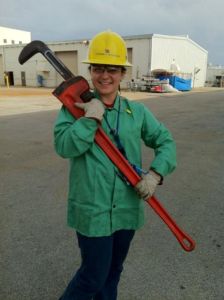
Casey Kraus, a third-year apprentice at Florida Power & Light’s St. Lucie Nuclear Power Plant, “loves” her work.
“I’ve always wanted to work with my hands, not have a desk job. I wanted to have a job where I could continually learn new things,” Kraus said. The $30 per hour starting wage was “absolutely” part of the appeal of a nuclear technician career, as well.
Kraus’ apprenticeship is part of the curriculum of the Power Plant Technology Institute that Indian River State College (IRSC), Florida Power & Light, and the International Brotherhood of Electrical Workers created together. In 2013, the American Association of Community Colleges recognized this collaboration as one of the Top Five College and Corporate Training Partnerships in the U.S.
"The IRSC and FPL's Power Plant Technology Program greatly prepared me for my career at the St. Lucie Nuclear Power Plant. Although there are some things in the field that can never be completely recreated in a classroom, I believe that IRSC and the FPL Subject Matter Experts made the program as close to real life at the plant as possible. Everything I've learned in the program I apply in some way to almost every job I go on each and every day. With the training I have received, I have to ability to take my degree and my INPO [Institute of Nuclear Power Operations] certificate, and work at any nuclear plant in the country. The possibilities are absolutely endless," she said.
The Power Plant Technology Institute is not IRSC’s only major effort in nuclear energy education. The Fort Pierce, Florida, college is home to the Regional Center for Nuclear Education and Training (RCNET), an ATE Center that is developing a standardized, systematic approach at 42 community colleges to educate technicians for a broad range of nuclear careers. In addition to the two-year colleges, the center partners with industry, government agencies, and universities on curriculum enhancements, faculty professional development, and student recruitment.
Kevin Cooper, RCNET principal investigator, said demand is growing for highly skilled nuclear technicians due to the large number of current technicians who are reaching retirement age and the expected growth of the commercial nuclear power industry in the U.S. A current industry report estimates that 41,000 nuclear workers will be needed by 2030.
Newspaper Ad Leads to Nuclear Career
Kraus, who was home-schooled, learned about IRSC’s Power Plant Technology Institute from a newspaper advertisement. She went to an information session at the college and was thrilled when her score on the college’s mechanical aptitude test qualified her for admission to the program.
The two-year associate degree that she completed at IRSC in 2012 included a six-week internship at Florida Power & Light’s St. Lucie Nuclear Power Plant. Upon her graduation, Kraus was hired by the plant as a third-year apprentice. From September 2012 to September 2013, she worked in the power plant’s mechanical maintenance department for three days each week. Two other days each week, she attended classes at IRSC for hands-on instruction in the valves and pumps used at the commercial nuclear facility.
“You have to study. It’s not something you can just sit in class and pass. You have to work at it. You have labs where you have to perform what you’ve learned and do it properly. It’s more than just tests … They teach you how to take apart a valve, and then they watch you go take it apart and put it back together,” Kraus said. She aspires to become a mechanical maintenance journeyman, the designation of a career technician at Florida Power & Light (FPL).
Kraus’ mechanical skills and career ambitions have made a positive impression on Ken Hall, the FPL employee who is the subject-matter expert for mechanical maintenance. “She’s been doing fantastic. She’s very mechanically inclined. She’s very smart,” Hall said. He also praised Kraus for performing complex procedures and articulating the rationale behind them. Kraus understands the importance of mastering the technical skills she has learned during her degree program and apprenticeship.
“All the work we do at the plant has to be done correctly because, if not, it could put the public or us in jeopardy, and cause millions of dollars in damage to the unit. There’s a lot of bad stuff that could happen if we do not do our job correctly. We have procedures we have to follow and if we do not follow them we are breaking federal law,” Krause said, adding, “If you do not take your job seriously, you do not work out here.”

 Subscribe
Subscribe


 See More ATE Impacts
See More ATE Impacts

Comments
There are no comments yet for this entry. Please Log In to post one.